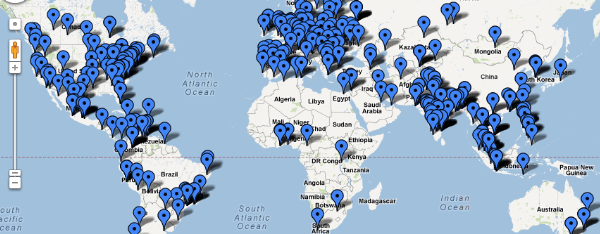3 Ways MOOCs Unleash the Power of Massive International Attendance

During my life I have always been interested in how ICTs can contribute to a better and sustainable development of the world. Education is one of the areas where that contribution can really make a difference. MOOCs (massive open online courses) might be one of the most versatile ways to offer access to quality education, especially for those residing in far or disadvantaged areas.
I have been reading many recent articles on MOOCs and how universities –mostly US ones – either feel threatened or believe it to be a universal solution to their budgetary issues.
So far the immediate effect caused by MOOCs on those of us growing up far from prominent universities is the opportunity to access quality education to complement “traditional” education one might be receiving locally. If you have participated in any MOOC, you might agree or not about the delivery or evaluation method or question its effectiveness, but you cannot deny the quality of most of them.
But from my point of view it is the massive attendance to the course the most relevant and interesting characteristic for analysis.
Mass Customization
Since their conception, MOOCs are not like “traditional” e-learning courses. Managing course delivery and evaluation for thousands of students at the same time requires adapting the model from the very beginning, making it completely automated. What we are seeing now is that different MOOC platforms are experimenting different teaching models and strategies. What models are best and which will survive? We don’t know, but for sure the competition is providing us with invaluable data to improve future implementations.
Universities and private organizations alike are running to positions themselves as MOOC leaders. This makes sense because the large number of simultaneous students potentially accessing the same content at the same time, from all over the world, requires a solid server foundation and impeccable response time. This is one of the reasons why only large universities or institutions can host this type of courses, and this is why it makes sense for small organizations to outsource the service rather than have their own servers.
But massive access to content doesn’t necessarily mean less quality. Personalized massive is possible, and though most MOOCs seem to serve the same course content to all participants, agent technology will soon allow for “individually” designed content to be delivered to each participant.
Data Bonanza
And because for the first time we are having thousands of people with different profiles accessing the same content at the same time, the opportunity for doing a statistical analysis of the population’s behavior is fantastic. We can know – with some limitations – when people connect, what sections they consult, how much time they spend, the errors they make, the resources the access. And then cross link the usage data with the user’s profile: age, sex, location, educational background, etc.
With large masses of collected data one could infer and detect trends, and as a consequence adapt course content to become more efficient and effective, and for example reduce drop off rates. But more importantly, we could learn why and how people take online courses, and improve e-learning in general. However, even though MOOCs have been in use for several years I still haven’t seen any statistical analysis of its usage by different user profiles. If you have any available please add it as a comment.
Self-Organized Groups
Another interesting consequence of the large number of attendants from all over the world is how these participants have organized themselves, the groups that are formed, how the collective intelligence of the worldwide audience can question the course content and turn it into truly globalized experience. This area of MOOCs is in its infancy, and a lot has to be experimented on social interaction, group work and virtual communities. But to me it looks that for some participants MOOCs are becoming not only a learning experience, but a life experience.
In summary, MOOCs represent an ideal that still has to be materialized into feasible, sustainable solutions. But I am looking forward to learning more about this new way of learning, and how it can better serve those that have less chances of accessing quality education.
